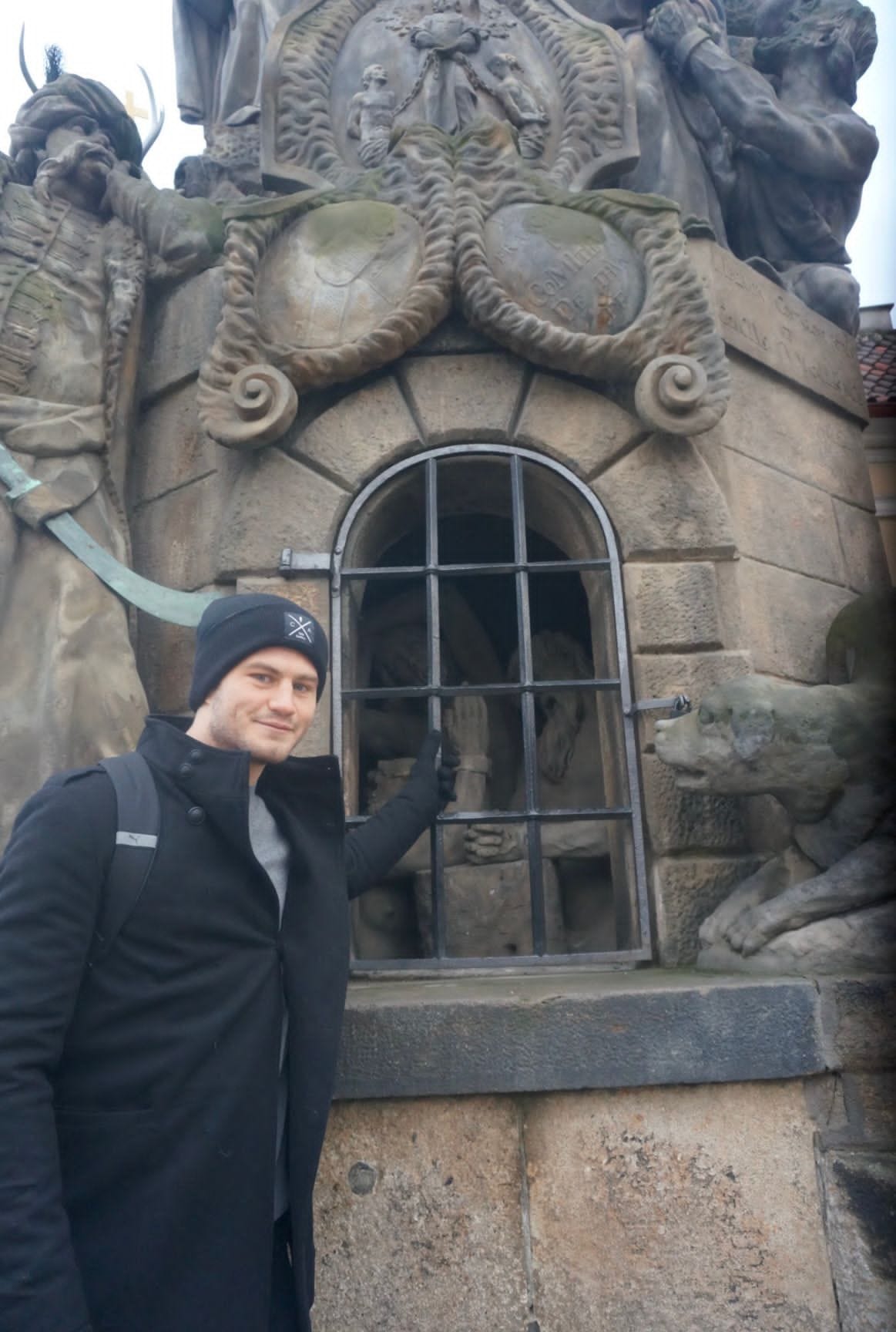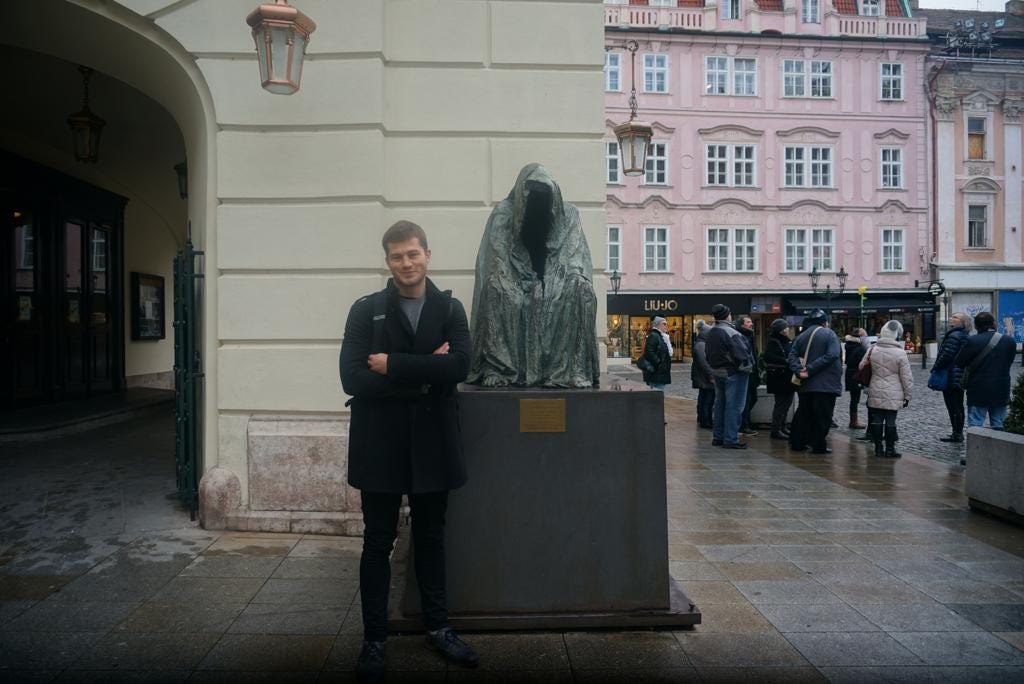The Golem (Analysis)
Yes, I know I promised two articles last week. Turns out I might have bitten off more than I could chew. I’ve had quite a bit of experience running critiques on other people’s work, but when it comes to my own (even something I don’t feel overly attached to) it’s a lot tricker.
For those who missed it, last week I announced that I was going to break down one of my older stories “The Golem.” If you haven’t read that one yet, you can find it here.
To avoid this becoming too dry an analysis, I’m going to skip over syntax, grammar etc and stick to the broader ideas which will (hopefully) be more interesting.
So, let’s get into it.
Originality of concept
This story shamelessly drew influence from Life is Beautiful (1997)—a movie I either watched at university or at high school. If you’re not familiar with that movie, it follows a father and son into a Nazi concentration camp wherein the father shelters his son from truly experiencing the terror of this ordeal by framing the entire experience as a game.
I feel the direction I took The Golem in, was sufficiently unique to avoid any plagiarism claims. But looking back, my story definitely could have benefitted from some additional brainstorming. I’ll dig into this a bit more later in this article, but my twist on this premise made a series of options available to me that not only would have given the story more depth, but also would have made it less derivative. Unfortunately I fell into too much tunnel vision to pursue them.
Voice:
Obviously, the limited narrator I chose for this particular story demanded a certain bassline of naïve, childlike language. But there is a fine line to walk when executing this.
When reading back on this version of The Golem my use of language caused me to cringe more than once.
“Usually, adults get bored waaaaay before I do. But they continued the star game for aaaaages!”
Sure this might be “realistic” use of language, but I can’t ignore the fact that if someone is taking the time to read an entire story of mine, they are agreeing to spend a given duration of time with the narrative voice I’ve chosen for the story. If that language is annoying, it’s a problem. Sometimes it’s better to trade off authenticity for readability.
E.g. even if I’m writing in the voice of unlikable character, I can’t make them so unlikable that the reader wants to stop reading. It’s my duty to use language that invokes the intended effect, while maintaining a bearable level of readability. Perhaps a reader will allow me the benefit of the doubt first time around, but if they recall the first experience as being a slog, they’re unlikely to give me the time-of-day on my next story.
If I were to rewrite this, I would tone down some of the more extreme instances of “child voice” and be more selective with the ways I invoke that effect.
Planting seeds:
As a rule, it’s always good to assume your readers are thinking people who can work out subtleties of a story without overt explanation. But this approach hinges on how well the writer has signposted the cues along the way.
Early on (and I’ve by no means eradicated this completely) I had a habit of leaving too much for the reader to extrapolate.
I’d deliberately leave a sparse number of hints along the way, hoping to make the reader feel clever should they “get” my ending. More often than not however, they wouldn’t “get it” and would be left confused. Who’s to blame? Not them. Barring extreme circumstances, a confusing story is always the writer’s fault.
Even on the occasions where a reader did “get it,” it was never with certainty. They’d ask, “was it about this?” with doubt in their voice. I’d then proceed to inevitably break into a half minute explanation about how they “weren’t far off the mark.” To which I might get a bit of a head nod.
Self indulgent. Not the satisfying effect I was hoping to invoke.
In case you didn’t pick it up (and I don’t blame you if you missed it) the final line of The Golem hinges on the dramatic irony surrounding the the boy who thinks he’s about to be saved when in reality he’s about to meet his death.
Perhaps you are one of the readers who did pick this up. But was it satisfying?
If I were to write this again, I would spend more time on the physical description of the Golem (and the Rabbi for that matter) then to make sure it remained in the reader’s mind, I would have scattered call-backs to this folk-tale throughout the narrative. Driving home it’s importance at every opportunity.
Planting seeds #02
Benowitz’s presence in the plot suffers similarly from my tendency to underplay important details.
Yes, it can be effective to plant a gun early on, let the reader forget about it then bring it out at the end for shock resolution. But reading back on this, I don’t feel I put enough time into fleshing out Benowitz’s character.
I should have layered in a bit of foreshadowing to suggest he might not be the most trustworthy man. I should have given him some memorable action that would immediately bring him back to mind the moment he returned to the story prior to the closing lines.
This would have made his eventual betrayal of the narrator feel more inevitable. A building sense of doom would have attached themselves to the moments leading up to his eventual confirmation of what the reader is dreading might happen.
Tense and POV
In retrospect the choice to write this in past tense was slightly odd.
Functionally it implies this boy is telling his story after all the events have occurred—therefore logic would imply that while telling the story, he benefits from full knowledge of what will ultimately happen to him in the end.
This final outcome is horrific. The narrator has either died in a concentration camp or he’s at least been taken away against his will by a Gestapo officer.
This demands a certain suspension of disbelief on the reader’s part. It begs the question, “is this narrator speaking from beyond the grave?” But, this logistical issue is relatively common in stories and will likely be overlooked by most readers.
The real issue lies in the narrator’s discovery process. He maintains his naïve innocence right till the very end of the story. So he’s wielding the authority of “someone who has been through this” yet is simultaneously discovering the story’s events in real time.
This requires a second leap in logic which is one level too far.
Had I written the story in present tense—this would also have allowed me to play around with his changing perspective as events piled on. As a rule, present tense creates a more immediate pace, which would have played into the theme of “finding things out” in a more powerful way.
Adherence to theme.
Reading back on this I sense that I was reaching for a more complex angle than I ultimately settled on, but either didn’t have the time or the vision to flesh it out.
The bit I’m referring to occurs in the sequence where the narrator is hiding in the mattress hearing glass break, his sister scream etc.
“I nodded.
Man it was hot in there.
Breaking glass.
Scary stranger’s voices.
A scream from my sister.
But I kept playing.”
Now that is a natural point for the illusion to fall down. Finally the boy is seeing the world for what it is. But directly following this, the boy shifts back to his naive perspective.
“No star in sight, but he did have a hat with big shiny panels plus some sort of staff.
Not how I pictured a wizard. But then again. I’ve never seen one in real life.”
This was a missed opportunity to reveal a more dynamic element to the story wherein we realize, “oh no, he’s not naïve at all. Part of him knows the terror that’s going on in here, but he’s choosing to believe the childish version to protect himself.”
This angle would have separated the story from Life is Beautiful and spoken to a deeper psychological point.
This could have made for a more powerful ending as well. I could have shown the boy walking into the Golem’s arms—the denial steering him in this direction, yet simultaneously he could have been sobbing all the way. His body recognizing the truth that his mind is unwilling to acknowledge.
The Subplot + alternate angles
Roughly half-way through this story I reference the mum being taken away.
“Our house had been so cold and smelly since my Ma left—”
This deserved more attention. If I had more time and a larger wordcount, I would have made the device of the bunker in the backyard —“the Garden Apartment”— work harder for the story.
Rather than framing this bunker as a last resort for the child to escape to should his father disappear, I would have filled the bunker with our narrators’ Jewish neighbours.
This is one of the alternative options I referred to earlier on in the article.
Were I to rewrite this story, I would have layered in an implication that Benowitz might have had a hand in the disappearance of our narrator’s mother—this type of backstabbing was an all too real element of the holocaust both in the ghetto’s and concentration camps. A self-preserving element of human nature that is uncomfortable to look at, but all too real among people faced with impossible choices.
This angle would have placed a greater burden of responsibility on the shoulders of our narrator’s father and posed him with a dilemma:
Does he maintain his child’s innocence and continue keeping the boy’s naïve illusions alive a la Life is Beautiful or does he confront him with the truth and ask him to step up as the new protector of the family’s neighbours?
The father’s ultimate refusal to see his son’s innocence broken would have made for an even deeper level of heartbreak because I’m sure it’s a decision that would split the readers of this story.
After all, the son’s decision to hand himself over to the Golem, was an unexpected outcome. This father couldn’t have reasonably predicted the tragedy that the blurring of lines between reality and story would produce.
You also wonder whether the son’s capture might actually save the hiding neighbors because this address is no longer under suspicion. It’s possible.
No good story has a strictly happy or tragic ending.
Missed opportunities
The above point, leads me to the most interesting aspect of writing these stories. While in the process, there is always a natural progression of logic. Nine times out of ten the first path that comes to mind is the most boring. If a certain plot point comes to mind right away, chances are, the reader will expect the same and therefore this will make for a predictable story. Writers aren’t the genius’s we sometimes like to think we are.
The part of the writing process that feels most alive for me is during the moments when I hit one of these crossroads moments. I’m looking ahead to multiple sets of options and realise there are things there that are much more interesting than what I originally came into this story expecting.
That’s exciting. It’s what gives these stories the quality of “writing themselves” or “having a life of their own.” The cause and effect feels like something that already exists somewhere out there and you’ve just tapped into it.
The downside.
The caveat to this is the fact that you have to select one of the options. There’s a temptation to cram all of the variables into the one story and show the world. “Look how clever I am. Aren’t I smart for thinking of all this?” but usually this doesn’t serve the story.
There is an unwritten version of The Golem where our narrator left a bunker full of his neighbours undiscovered as he was marched off by the Gestapo.
There is a version where his father breaks the news to him that this is no game.
There is a version where the boy’s suspicions break through and he realises for himself what is really going on.
A good writer will see all of the variables. Recognize the single path that will make for the best story and—this is the hard part—leave all the other options unwritten and therefor unread.
That’s the weird bit. You feel an attachment to those ideas—after all you are the only one who can give them life. But at the same time, they seem like independent entities who equally, won’t get to see the light of day because you as the writer didn’t deem them worthy.
I know this part might alienate people. I’m definitely adding a layer of importance to what I do which a lot of people will find hard to swallow or may even reject, but it’s interesting to think about.
Anyway, that was a bit of an experiment. Please let me know if this deep dive was interesting, too in the weeds for the layman or just plain boring in general? Sorry again for promising two articles in one week then failing to deliver. I won’t make that mistake again.







